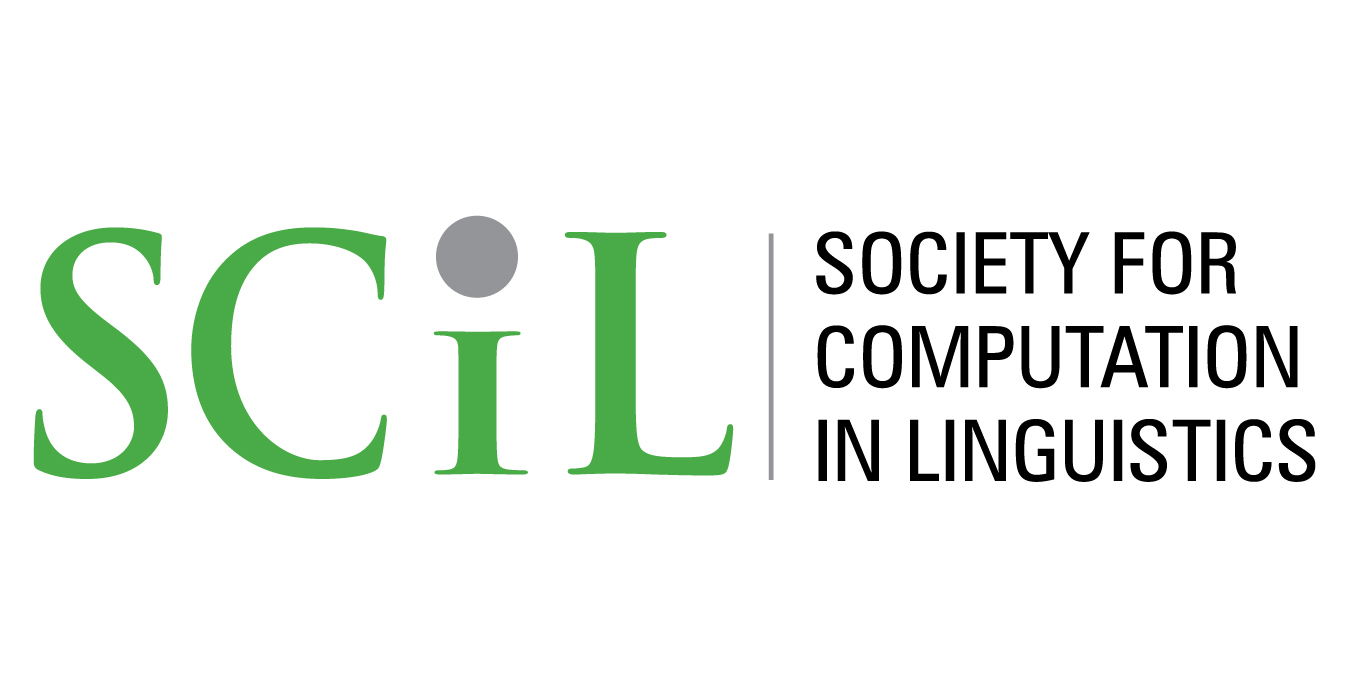The Society for Computation in Linguistics (SCiL) is devoted to facilitating and promoting research on computational and mathematical approaches in Linguistics. SCiL aims to provide a central forum for exchange of ideas and dissemination of original research results on computational approaches in any area of linguistics. In addition to providing a forum for researchers already working in these areas, SCiL hosts regular meetings (the first of which was co-located with LSA 2018 in Salt Lake City, Utah) that feature high-quality research presentations and peer-reviewed proceedings published with the Association for Computational Linguistics (ACL) Anthology as well as in our own standalone open access publication, the Proceedings of the Society for Computation in Linguistics.
This journal has moved to our new publishing platform: https://openpublishing.library.umass.edu/. All issues can be found here: https://openpublishing.library.umass.edu/scil.
Current Volume: Volume 6 (2023)
Papers
Preface: SCiL 2023 Editors’ Note
Tim Hunter and Brandon Prickett
A third structure building operation for Minimalist Grammars
Johannes Schneider
A TSL Analysis of Japanese Case
Kenneth Hanson
An Algebraic Characterization of Total Input Strictly Local Functions
Dakotah Lambert and Jeffrey Heinz
Analogy in Contact: Modeling Maltese Plural Inflection
Sara Court, Andrea D. Sims, and Micha Elsner
CANDS: A Computational Implementation of Collins and Stabler (2016)
Satoru Ozaki and Yohei Oseki
Does a Neural Model Understand the De Re / De Dicto Distinction?
Gaurav Kamath and Laurestine Bradford
Extending Finite-state Models of Reduplication to Tone in Thai
Casey D. Miller and Aniello De Santo
Extracting binary features from speech production errors and perceptual confusions using Redundancy-Corrected Transmission
Zhanao Fu and Ewan Dunbar
Filtering Input for Learning Constrained Grammatical Variability: The Case of Spanish Word Order
Shalinee Maitra and Laurel Perkins
An Incremental RSA Model for Adjective Ordering Preferences in Referential Visual Context
Fabian Schlotterbeck and Hening Wang
Language Models Can Learn Exceptions to Syntactic Rules
Cara Su-Yi Leong and Tal Linzen
An MG Parsing View into the Processing of Subject and Object Relative Clauses in Basque
Matteo Fiorini, Jillian Chang, and Aniello De Santo
Modeling island effects with probabilistic tier-based strictly local grammars over trees
Charles J. Torres, Kenneth Hanson, Thomas Graf, and Connor Mayer
Neural Networks Can Learn Patterns of Island-insensitivity in Norwegian
Anastasia Kobzeva, Suhas Arehalli, Tal Linzen, and Dave Kush
Noise-Tolerant Learning as Selection Among Deterministic Grammatical Hypotheses
Laurel Perkins and Tim Hunter
On the Spectra of Syntactic Structures
Isabella Senturia and Robert Frank
Parasitic gaps in Japanese: An MG-based approach
Yu Tomita and Hitomi Hirayama
Parsing "Early English Books Online" for Linguistic Search
Seth Kulick, Neville Ryant, and Beatrice Santorini
Phonological processes with intersecting tier alphabets
Daniel Gleim and Johannes Schneider
Rethinking Representations: A Log-bilinear Model of Phonotactics
Huteng Dai, Connor Mayer, and Richard Futrell
Stochastic harmonic grammars do not peak on the mappings singled out by categorical harmonic grammars
Giorgio Magri
Subject-verb Agreement with Seq2Seq Transformers: Bigger Is Better, but Still Not Best
Michael A. Wilson, Zhenghao Zhou, and Robert Frank
Subregular Tree Transductions, Movement, Copies, Traces, and the Ban on Improper Movement
Thomas Graf
Text Segmentation Similarity Revisited: A Flexible Distance-based Approach for Multiple Boundary Types
Ryan Ka Yau Lai, Yujie Li, and Shujie Zhang
Assessing the Featural Organisation of Paradigms with Distributional Methods
Olivier Bonami, Lukáš Kyjánek, and Marine Wauquier
The Learnability of the Wh-Island Constraint in Dutch by a Long Short-Term Memory Network
Michelle Suijkerbuijk, Peter de Swart, and Stefan L. Frank
Unbounded Recursion in Two Dimensions, Where Syntax and Prosody Meet
Edward P. Stabler and Kristine M. Yu
Corpus-Based Investigation of the Markedness and Frequency of Japanese Passives in Contemporary Written Japanese
Tatsuya Aoyama
Extended Abstracts
Can language models learn constraints on gap-filler dependency? Case of Japanese relative clause islands
Maho Takahashi
Differentiable Tree Operations Promote Compositional Generalization
Paul Soulos, Edward Hu, Kate McCurdy, Yunmo Chen, Roland Fernandez, Paul Smolensky, and Jianfeng Gao
Do language models know how to be polite?
Soo-Hwan Lee and Shaonan Wang
Evaluating a Phonotactic Learner for MITSL-(2,2) Languages
Jacob K. Johnson and Aniello De Santo
Formal Properties of Agreeing Minimalist Grammars
Marina Ermolaeva and Gregory Kobele
Bridging production and comprehension: Toward an integrated computational model of error correction
Shiva Upadhye, Jiaxuan Li, and Richard Futrell
What affects Priming Strength? Simulating Structural Priming Effect with PIPS
Zhenghao Zhou and Robert Frank
Abstracts
Corpus-based measures discriminate inflection and derivation cross-linguistically
Coleman Haley, Edoardo M. Ponti, and Sharon Goldwater
Evidence for Efficiency in Chinese Abbreviations
Yanting Li, Gregory Scontras, and Richard Futrell
Investigating Morphosyntactic Variation in African American English on Twitter
Tessa Masis, Chloe Eggleston, Lisa J. Green, Taylor Jones, Meghan Armstrong, and Brendan O'Connor
L0-regularization induces subregular biases in LSTMs
Charles J. Torres and Richard Futrell
Learning phonotactics of any span and distance
Ignas Rudaitis
Do All Minority Languages Look the Same to GPT-3? Linguistic (Mis)information in a Large Language Model
Sydney Nguyen and Carolyn Jane Anderson
Modeling Substitution Errors in Spanish Morphology Learning
Libby Barak, Nathalie Fernandez Echeverri, Naomi H. Feldman, and Patrick Shafto
Processing French RCs with Postverbal Subjects in a Minimalist Parser
Daniel Del Valle and Aniello De Santo

